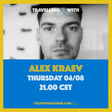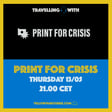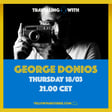The Importance of Art and Social Platforms
00:00:17
Speaker
There are so many people who think they can live without the art or without going to cinemas or to theaters or to concerts because they think it's all not necessary. But they're all getting the hang of it that you need it for socializing. It's not only that you consider it home and watch movies that already exist, but you kind of
00:00:44
Speaker
at one point know that there are artists behind it that made that possible and that make you not completely driving insane during all the lockdowns. So I think those and the social workers, they definitely need to get hurt.
Introduction to 'The Yellow Van Stories'
00:01:11
Speaker
Hello and welcome to a brand new episode of The Yellow Van Stories, your interview podcast taking you across the globe in a yellow French campervan by the name of Fonzie. I'm your host and driver Bastian. Every week I invite creatives from all over the world into the van to explore with them the opportunities hidden within a crisis and more generally what life is like in their part of our globe.
Challenges in Covering Myanmar's Democratic Struggle
00:01:36
Speaker
Last week I announced that we would be dedicating the entire month of April to Myanmar and an initiative that supports the current democratic struggle there. Unfortunately, with more and more terrible news reaching us every day, it has proven impossible to keep to a schedule.
00:01:54
Speaker
But please note that this is only a slight postponement while we continue setting up in the background. The brave people of Myanmar need all the support they can get and we intend to do what we can in that respect.
00:02:09
Speaker
In the meantime, as difficult as this transition is, we will be traveling in my neighborhood. Fonzie's in first gear already and we are good to go.
Meet Claudia Hector: Film Industry Insights
00:02:19
Speaker
So buckle up, because today we're picking up a very special guest in Stuttgart in Germany.
00:02:32
Speaker
Here with us in the yellow van today is Claudia Hector, camera assistant and camera woman from Stuttgart, from Stuttgart, from Stuttgart in Germany, and most importantly, my sister. And I'm so happy to have you here. Hi, Claudia, how are you?
00:02:49
Speaker
I'm fine, thank you. Nice being with you. Nice having me, right? Thanks, that's very kind. It's so nice that you're here with me today. I have to, and I think a lot of people might also wonder, I have to say this in advance because I announced that we would have an episode on Myanmar in the whole month.
00:03:09
Speaker
this month because, but it's a very difficult, the situation is very difficult to keep, it keeps changing daily. So we had to postpone it for the moment a little bit and you decided to jump in and I am actually very happy because I wanted to do this with you anyway for quite some time. And now it's happening a little sooner than expected, but it's happening and I'm so, so happy that you were available today.
00:03:38
Speaker
Yeah, you're actually very lucky because I'm right in between two projects and I'm very busy at the moment. And I feel very lucky and now I feel even luckier, like much, much luckier. So I'm so glad that the family ties were strong enough to bring you on the show today. So I could arrange a few hours for you, you know.
00:04:04
Speaker
Thank you when busting holes. So let's start with the most important question as usual. What drink did you pour yourself?
00:04:14
Speaker
What are you talking about? I thought about you and I know you like chintonic, so I poured myself a chintonic for you. I actually don't drink it a lot. Get out of town. That's exactly what I poured as well. Yes, look, I know you. So I thought I'm just going to have a chintonic with you. I'm so predictable. Wow. But I'm out of lemon, so I just poured a little bit of lemon juice in it and some self-made grenadine syrup.
00:04:40
Speaker
Oh, that sounds very good, though. I didn't have lemons either, so I had... Well, that speaks for creativity, obviously.
00:04:50
Speaker
Not that I'm surprised, you know, it's just something that doesn't surprise me at all. But I also have a Gentonic because, you know, usually, I mean, you are, I think, one of the three people that follow this podcast regularly, right? Thank you very much for that, by the way. Yeah, you're welcome. It's you, it's you, it's you, Mum, and, and Gerasimos, and Inkew. Thanks, guys, by the way, for tuning in regularly.
00:05:14
Speaker
And a big shout out. And so I usually try and pour a drink that has some sort of local flavor of whoever I'm talking to. But since we're both German and I decided that's not too far away from Munich. I thought I'd just go for a regular gin tonic. And I poured it over a little bit of grapefruit. That's my preferred way of drinking it. I don't have grapefruit here either.
00:05:42
Speaker
Well, I happened to have a grapefruit, so I was like, I'm all in. I pulled it. Yeah, that's good. And yeah, so cheers. Cheers. To our ride in the yellow van. I'm so happy. Yes. I haven't been in the yellow van for ages, so.
00:05:59
Speaker
I know because it's parked in Greece, right? It's not really right around the corner, so that might have something to do with it. Also, where are you right now? That's what I would like to know. Because you say you're in between two projects, so right now, where are you? At the moment, I'm at home in Stuttger on my couch. I like that couch because it's very big and very comfortable. And so I decided to stay here. It looks very, very nice by the way. Yeah. That's very nice.
00:06:31
Speaker
So what if you had to pick your favorite thing in that room? What would that be?
00:06:36
Speaker
Of course I thought about it already before. Of course you did, because you came prepared. I actually thought about my guitar that's hanging on my wall, but then I decided it's not the guitar on the wall, it's a lamp. It's in the shape of a telephone and it's yellow and we picked it up on the flea market once a few years ago and I really, really liked that lamp.
00:07:07
Speaker
Great, I'll show you. All right. At least you can see it. Yeah, show me. I will describe it. I will describe it. Right now it looks a little overexposed, so it's mainly a big yellow glare of light, but I can see that that's kind of like a phone. I will have to come and look at it for real once, because we just realized I haven't visited you in Stuttgart yet.
00:07:34
Speaker
I am just terrible. I am... What can I say? Yeah, well, you're busy, I'm busy, you know. Happens all the time. It's on my bucket list, just so you know. It really is on my bucket list. But sorry, before that, there's still skydiving, going to India. Yeah, exactly. There's a bunch of other things, but I think you did position 32 or something like that. At least under the top 50, you know, so...
00:08:02
Speaker
That's good. I mean, isn't that... That's better than top hybrids, you know? Maybe I can wait some time
Balancing Creativity and Personal Life during the Pandemic
00:08:08
Speaker
and put you someday. Yes, we'll figure something out. Maybe when I come back from India, I can just give you a call and then we set it all up.
00:08:18
Speaker
Awesome. Yeah, I just came to me. I moved out then something, but yeah, just give me a call then. Or maybe you will move to India. Who knows? And then I can just come and visit you there. Just two things. Two birds, one stone. Anyway, we will see. Sounds great. I was always thinking about India.
00:08:39
Speaker
moving there. Yeah. Me too. Wow. Me too. Yeah, so much for carbon busting. A couple of months. We could almost be renamed. Just a few weeks. So, I mean, first you guessed my drink right. So I'm apparently very predictable, but you, I mean, you have been, you've had to hang out with me quite a bit growing up. So I think that might have something to do with it as well.
00:09:03
Speaker
More than I wanted normally. Poor you. Poor you, by the way. I mean, poor you. I was always great with you. You were a very good older brother. Yeah.
00:09:12
Speaker
Oh, stop it now. Okay, fine. Okay, you can say it. Okay, fine. Let's let's stop it. But thank you. But thank you very much. So that's, you know, usually because you know, right, I don't have to really take, take you through it or talk you through it. I will just read a quick short little introduction to also point out that you are just my, my sister, you do other stuff as well. You're not my sister full time.
00:09:42
Speaker
No, you are actually, but it's not your full-time profession. It's more like something that you couldn't choose. You should though. You should a lot. I think so too. I think you should. You should get a lot of money for that. But sorry, it's not in my hands really, because I got none. So there's nothing I can do.
00:10:01
Speaker
Yeah, no, I got more than you. Yeah, that's a fact. Probably. Most probably. It's safe to say. So, I was going to... No, I'm still going to. I'm going to read your introduction. Sorry. After what you just said, I will not read that introduction anymore. Sorry. Of course, I'll read that introduction.
00:10:23
Speaker
And then we'll take it from there because I have a lot of questions for you film related of course as well. Awesome. Because I think there are some really really interesting things that you could help me and help everybody figure out. I hope so. I think I'll give you your perspective on that.
00:10:38
Speaker
So here's your little introduction.
Claudia's Film Career and Gender Dynamics
00:10:40
Speaker
Are you ready? Yeah, I'm ready. Claudia is a camera assistant from Munich in Germany, now currently residing in Stuttgart, maybe soon in India. Who knows? And above all, she is my baby sister. And I say baby sister in the most lovable way, because it's not that you're my baby sister, you are a grown woman and everything. But for me, you will always be, to me, you'll always be my baby sister.
00:11:05
Speaker
For close to 10 years now, Claudia has been honing her craft in film and cinema, steadily rising up in the camera ranks. Her passion and joy are absolutely infectious despite the obvious stigma of this particular objective of late. She has been a part of many big German film and TV productions working with some of the finest German actors, directors, and camera operators, and I'm extremely proud of her, and I couldn't be happier to have her on board today to discuss with her the challenges cinema is facing during the pandemic
00:11:33
Speaker
and also what it is like to be a woman in a still largely male-dominated field. So welcome to the Yellow Van, Claudia, once again. Thank you. Don't mention it. Very honored. Glad you are here. So I would like to know, you said you are in between two projects, right? Yes. So which project have you just finished? What were you working on?
00:11:56
Speaker
I was working on a movie for the cinemas. He goes around Stuttgart actually in a little village. It's a drama about a woman coming home to her family or to the place where she grew up, where a lot of things happened. And I don't want to tell too much because I think the story kind of
00:12:26
Speaker
Explains it doing seeing it and I think if I would say anything now, I would spoil it for a lot of people At least determine listening fair enough. So yeah, it's called coming home and it was very Five exhausting weeks but also very interesting and very intense and I learned a lot and
00:12:52
Speaker
still. But I'm still glad it's over and I could find a little time to sleep. Yes, it was long, right? How long were you on the set for now? Five weeks. We were mainly shooting in the village. But we stayed there during the week and I just came home on weekends to wash my clothes.
00:13:18
Speaker
And sleep, of course, a little bit. Very understandable, yes. So for five days you didn't sleep and then you had a weekend to catch up on sleep. Is that how it works? Kind of like that. You worked 24 hours straight. And then you had the weekend. Okay. Wow. You film people. Amazing. Amazing resources. That's why we get so old so fast. Impressive. I look like 60. I'm actually just 30, but...
00:13:47
Speaker
Wow! I think you don't look old at all. Because that would make me look even older. I think that's the tunes of my mom. Of our mom. And dad. Sorry, and dad. Of course, dad too. Dad as well. We love you dad. Yes, okay. Because the other day when I spoke about the camping with Shao, I got some...
00:14:13
Speaker
some feedback from him. I'm just a little more careful. So that was the one. What's the next one? The next project you're working on?
00:14:24
Speaker
The next project I'm working on is going to be a love movie in black and white and we're going to shoot that thing. That sounds super interesting. Yeah, it's very interesting. It's either the cameraman who's... Cinema TV. I'm not sure yet. I don't have a lot of information because they kind of
00:14:45
Speaker
having the first film project at the moment. So there are a lot of people who do that for the first time. And so it's the chaotic, the information flow doesn't work properly. But at least they need a focus puller and that's me. And yeah. All right. Yeah, but it's an Academy film then like a film Academy film.
00:15:10
Speaker
No, it's actually from an artist, a musician. The band is called Captain Peng. I don't know, it's a German band.
00:15:26
Speaker
Oh, I will link to that because Captain Pank is just... I am such a fan. I am such a fan. Some of the best rhymes. Sorry for all English-speaking listeners. It will be difficult, but he is just... The rhymes, the lyrics, the music, the videos, the videos he made. They are nice videos. They're just amazing. So big shout out. I love their work. It's absolutely fantastic. So that should be fun.
00:15:53
Speaker
So because when you say they're doing it for the first time, obviously they have a lot of video and film experience, but it's their first feature film then. It's their first long movie. That sounds super exciting. Can't wait to see what comes out at the end.
00:16:09
Speaker
Me too. I guess everybody. That's what film is all about, right? Yeah. But it's cool. The DOP, the cameraman, I had worked with him before. He got me on that project actually. He makes really nice
00:16:31
Speaker
pictures so you can um he's he's i like him very much uh and his work so what's his name i think it's gonna fabian gampa he's actually from big shout out to fabian gampa yeah right and i will link to him as well so that yeah so that it was worth it for him to be mentioned as well that's so yeah that that sounds very exciting very exciting and the best side of working yeah sorry yes
00:17:00
Speaker
The best side on it is actually the project is not going to be shooting in Germany, it's going to shoot in Sicily. We're going to stay in Palermo for a month. So that's kind of nice.
Adapting Film Sets to Pandemic Conditions
00:17:12
Speaker
That's not too shabby. Not too shabby.
00:17:19
Speaker
Oh, nice. It's going to be okay, I think. I think that's going to be okay. I feel I don't have to worry about you too much anymore. I think you've got to be in good hands there.
00:17:32
Speaker
I think so too. Okay. So now that you are, because, you know, right at the beginning, this is interesting to me because in the beginning, obviously, everything shut down when we had the first shutdown, like almost a year ago. Also, film sets were closed and everything. How is it now? What are the biggest challenges you guys are facing on a film set nowadays during lockdown and pandemic?
00:17:56
Speaker
It took a while for the film industry to get feet on it again on the ground to know what to do and what to look after. But I think the film industry is also one of the industries that are very fast in adapting. Last year there was already
00:18:19
Speaker
people getting to be like a high chain consultant you could like have workshops video afterwards have the certificate of a high chain consultant so you had a,
00:18:31
Speaker
he were on a project and there was always one person just looking that everybody wears a mask, that there's every test that is affordable at what time it is affordable, that everybody's getting tested, that there's a lot of possibilities to wash their hands or to
00:18:53
Speaker
to get some fresh air into the sets and stuff like that. So I think the film industry is very, very fast in it and very quick in adapting. And the last shoot now, we like, of course not everybody likes it a lot, but there was always like after an hour or two, they said like, okay, everybody has to go outside from the set. So the set can get fresh air and everybody can get in there again.
00:19:21
Speaker
after we had like 10 minutes break and of course it's time that gets lost because we all work long hours but I think it's good because I think sometimes you actually need that and maybe the slowing down things sometimes is better than hurrying everything through so I think that's actually a good thing that happened.
00:19:47
Speaker
Yes. And I think you have obviously the advantage also that other art forms have a live audience and a film set is not with a live audience. So I think that makes a lot of things a little easier. You don't have to press anymore that comes to make pictures.
00:20:04
Speaker
other people that interrupt a set and that's probably also very good because before that you always had people that come and stare and want to see and people get their friends by and so that's all interrupting and that's not possible anymore because everybody has to get tested beforehand and of course there were scenes rewritten where you don't have a lot of extras on the set so you don't have too many people there but still there are a lot of possibilities I think.
00:20:37
Speaker
And obviously, I believe it also depends on the scenes, right? I mean, you said the next project is a love film. I would imagine that a love film needs to show some physical closeness, at least to some degree, right? But if everybody is tested, and then most probably on a regular basis, right? Probably every three days, two days, how does it work? Do you know?
00:20:59
Speaker
And on the last set, we were tested two times a week. So was it always Mondays and Thursdays? And at this set, because we are very isolated in Sicily, in this villa, we stay and shoot. And we are not a lot of people. So I think it's kind of a really isolated area and place. So when we get tested regularly once a week or twice a week, I think there's going to be no problem.
00:21:30
Speaker
So you're not just in the villa because it's super nice there, which we're sure it is and all hope it is, but also because it is most probably also part of the hygiene concept, right? So there's a bit of an isolation. Okay. But you also said that it slows things down a little bit. So now the production usually takes a little longer for a film, for a movie? No, I think it just...
00:21:55
Speaker
You just work faster. You just do everything. You take more breaks, but when you work, you work faster. Yeah, that makes sense, I guess. People just talk on fast speed, fast forwards. Yes, sorry. If you don't hit 100 words a minute, you're off the set.
00:22:17
Speaker
That's part of the hygiene concept, I'm sorry, I'm not making this shit up. No, it's really, it's just the thing, yeah. No, I'm actually not, because I'm not in the whole production organizing things beforehand, so I don't know if they got the extra days they didn't have before, I just know like a normal film set has
00:22:39
Speaker
21 to 25 shooting days. So this is kind of the thing where you shoot the film. And if it's 21 and now gets 23 days or 25 days, I don't know because mostly I'm on the project when they just tell me how much days they have. So that's like fun. Okay. Yeah. Fine. We don't need to get that much detail anyway. I think maybe they get an extra day or two.
00:23:10
Speaker
Yeah, we got the picture a little bit at least that it has changed slightly. And do you think that this is something that will be, I mean, if we venture out to say that one day this will all be behind us, right? It feels like that moment has been postponed and postponed and postponed. But when all of this is over and everything is back to normal again,
00:23:38
Speaker
Do you think there's anything that will change for the better through this or will it just like anything that you can take away from this for the future of filmmaking in a sense or is it really just something that will just be adapted as long as the pandemic lasts?
00:23:55
Speaker
I'm not sure, actually. For myself, I know that I changed thinking about my work a little because I love my work. I'm really, really happy being on the film set and making my job. But I recognize during the last year, that's also really, really nice having the time in between for yourself.
00:24:24
Speaker
Coming back, relax.
00:24:27
Speaker
take some projects that you don't do otherwise or even be creative in the work. I like crafted my own power box where I can just put in my whole battery chargers and stuff and that's like things that you have in your mind that you would like to have that and then you don't do it so now you have more time in between that project so you
00:24:55
Speaker
You have the time to do it and can be creative in another way. And it's actually, I like that. And I try to, uh, think about having this balance, um, further on, like even when you can work normally again, like, yeah, I just think I'm like, this is actually, I hear that a lot.
Improving Film Industry Work Conditions
00:25:16
Speaker
I hear that a lot from a lot of people that this is, it changed the perspective in the sense what is good for me, for a lot of people. This is really one very common answer, not to say that you are common in that sense, but I think it's something that everybody can get behind that. It's like a re-grounding of is happening as well.
00:25:40
Speaker
at the same time, obviously also have to qualify it in the sense also that it's this is obviously a luxury that not everybody has, right? I mean, so people don't have this luxury. This is also a sign of a certain kind of, you know, privileged position. But if you can do that, that's that's great. That's wonderful.
00:25:59
Speaker
There's actually like, there's a, how do you say it in English? A labour union or a union. Yeah, a union. That is actually, I think that they got a little bit stronger now or the things they want got a little bit stronger. The community is big.
00:26:21
Speaker
To achieve things like because we have like when we work our working days are always 10 hours plus so that's what you like when you want to when you when you talk to the producer you always talk about the 10-hour day and The union actually was trying to to change that so you don't have the 10-hour day anymore for more like an eight-hour day and
00:26:47
Speaker
or at least we have the weekends off. So that the working in the film industry gets a little better for families because I think that's kind of also the people found out that it's not worth it working your ass off when at the end you don't have anything off it. So that's kind of things that get stronger at the moment.
00:27:14
Speaker
That's a very positive effect, at least, I think. Because I know film sets, they can be very demanding, also from my own personal experience. They can be very demanding and to accommodate family and a film altogether, that can be very hard. So if there's some recalibration there, I think that can be very positive. Yeah. I think so too.
00:27:42
Speaker
I would like to move on with you to women in cinema. I think that's a very, very interesting topic. And I will confront you with the following sentence, right? Film and especially camera is still a very male dominated area. Would you agree with that? Yes. I would. Good talk then. You want to hear more?
00:28:11
Speaker
See, this is interview 101. Don't ask close questions, right? So, yes. No, thanks. That answers the question. Thank you very much. Moving on. Well, yes. I have to admit, I don't know the exact percentage now of camera operators, male and female, but I think it is, but it is a large discrepancy, right, between male and female.
00:28:39
Speaker
It gets less, but still... I have that impression too. I do, yes. You see a lot more talented filmmakers, female filmmakers. That's amazing. At least in the international wide area, you can see a lot of more coming up. But yes, I think it's getting less, but I think there's still some...
00:29:07
Speaker
difference between male and female operators or at least in the camera department and the grip department and the life department. Like everything where you kind of have hard work and there are always old people who look for their team. It's going to be kind of the
00:29:28
Speaker
I had a lot of people telling me like, yeah, but you cannot have a lot of equipment or you cannot carry as heavy as men do. So I didn't get a chop because of that. Or because they tell you, you have the, I don't know.
00:29:48
Speaker
It's again something I don't know in English. What? That's like a uterus.
00:30:06
Speaker
lowering of the uterus, I would say. Because they're worried about your uterus, that's why. Yes, because when women carry too heavy, it can happen that the uterus lowers or kind of, yeah, you can say it like that. And that's not very good, of course. It doesn't sound very good.
00:30:36
Speaker
Not really get any kids anymore if that happens. Well, I was assuming that yeah, okay, so that's kind of also The excuse for men sometimes like it had no I cannot because you cannot carry that much so because of you But you've really like a lot of time
00:30:55
Speaker
I heard that, especially from one person I had to work a while with, and he kept on saying that. On the other side, he also said, like, why can't you carry that alone? You have to carry that alone. It's part of your job description.
00:31:11
Speaker
And that's like 20 kilos of weights. And you just want me to lift them alone with the whole set there. And then the other thing that's really, really not so heavy, you want to have it and carry it alone. So that's kind of, yeah.
00:31:31
Speaker
Some people are just very old school and that's why they think women cannot handle that amount of things that men can handle. But to be honest, I think nobody should carry a big lamp on their own. They should always carry it together. It doesn't matter if you're a woman or a man, you should always protect your back and your muscles.
00:31:56
Speaker
I absolutely agree with you. Yes, I absolutely agree with you. So in that sense, if you look at it that way, it would be just actually positive for women to be there because then you will just be maybe more mindful even of not carrying the heavy stuff on your own that goes for men as well as for women because for neither of them, it is necessarily very, very healthy even if you can maybe carry 20 kilograms on your own.
00:32:22
Speaker
It's still not going to be very healthy and good for your back if you do that for 20-30 years, so I think I call bullshit on that. Yeah, me too. There are a lot of second ACs nowadays, like second camera assistants, that's kind of
00:32:41
Speaker
the people who are my assistant, I'm the assistant of the cameraman, they are my assistant more or less. If you look at the hierarchy, that's kind of the thing. But normally, we're just one team. But there are a lot of more women nowadays than before. And I think the first ACs focus puller got more as well. And now it's just the jump to get female operators and DOPs. And I think the
00:33:11
Speaker
The more responsibility you have, the less females you get because there are just a few that don't trust a female being responsible of how the picture should look like.
00:33:29
Speaker
But yeah, I think that's changed. But there's still a lot of reservations. There's still a lot of reservations. But you say, though, that it is changing. And to be honest with you, if I look at it now, and it's always difficult, right, because we're also part of in our bubble. I'm in my bubble and I try to get out of it and leave it as open as I can. But, you know,
00:33:52
Speaker
I'm as imperfect as everybody else, so I do not know all my blind spots. But at least it is my impression as well that there are more female camera operators, more female directors as well that do incredible work. And I feel there's a lot of stuff happening there. There's definitely something rising up, which I think is absolutely fantastic. Now, would you say that is because of
00:34:23
Speaker
women just really also discovering that more and more as a domain that they appreciate, that they love, that they are appreciating filmmaking more. Is it a societal thing also that there is a greater awareness for that to happen?
00:34:40
Speaker
Or is it also that film sets and film productions pay more attention to that and offer a little more support? Or is it maybe something all the three things combined or something I didn't even think of? Why do you think it is? That's actually the bottom line of the question. I think that women are more aware of what they can achieve and what they want to achieve than before.
00:35:09
Speaker
You know, like when you go to the 70s, women were always told that they shouldn't do it or that they belong to the house and the man gets the money in. And I think it took quite a while for women to evolve and to change or to think.
00:35:30
Speaker
differently and say, OK, you know, I can do that. And of course, in the 70s, there were a few women that already thought that, but there were a lot of women that didn't even think about it or didn't want to think about it. And I think that they're just at the moment.
00:35:46
Speaker
taking back what's rightfully theirs. So I think this and that there are a lot of more men out there as well that just don't care anymore. They don't want to be the
00:36:03
Speaker
the male part or they don't want to be the stronger part, they are supporting women because they think of course they can do that and they have a nice and other opinion maybe and that's also doing good, you know. So I think it's kind of a thing of everything that that's just now maybe the time for a change and everybody sees that there's time for a change or should be a change.
00:36:29
Speaker
Yes, I believe that's obvious to me at least. I see a lot of female camera work for instance. I'm trying to think of this
00:36:45
Speaker
I just saw this German. I can't think of the name now. It was absolutely beautiful. Not having to say that and stretch that because that's what I'm doing now is actually almost positively discriminating. But I think there is something. What I'm trying to say, I think, is that there is something in how
00:37:02
Speaker
women make pictures that is absolutely very poetic and beautiful and can also be everything else that a man also does, right?
Women Enriching Storytelling in Film
00:37:14
Speaker
It has all different aspects and like everything, our pictures will just be richer. The more people with the more perspectives we have, the more diverse, the more
00:37:26
Speaker
inclusive, the more, the bigger our creative space will be. And this is what I'm seeing and this is why films are also becoming so, I think films are becoming very rich and very, very
00:37:44
Speaker
develop also very specific views, very specific focal points, I think also a little more than in the past. And I think that's also a little thanks to that. I might just be imagining that, but I believe to some degree that is the point. How do you see that? I think that
00:38:05
Speaker
For example, if I look at my job, my job at set is I'm pulling the focus. I'm deciding where the focus is in the whole picture. Of course, I'm mostly not deciding this on my own. I'm talking to the DOP or to the director or to both, and then we decide where we want to have the focus.
00:38:33
Speaker
back of the door when the person comes in or if it's in the front where the guy sits. But still I think the
00:38:45
Speaker
my perspective or the way I see things are different than the way men see it or probably not all men but I think that women often go there in a more intuitive way or they have a different feeling maybe men often do it very technical and I think we women
00:39:09
Speaker
Mostly not having the technical part as the as our primary thing. That's more like the second thing So yes, I think it's I think I think also that doesn't that doesn't go all the time That's you know, you also find women that are technically absolutely amazing So just also to make sure and you know that of course, but in my
00:39:34
Speaker
in my long experience. I mean, okay, fine. In some of the stuff that I've done, I've gained a little bit of experience. I think to some degree,
00:39:49
Speaker
And I'm really very, I find it difficult to make generalizations, but I will venture out and make one. This is a generalization, a very conscious generalization, right? So there will be many exceptions. And if you are an exception, don't take any of what I'm saying now at face value. But if I take my experience over the years, I do believe males and male camera operators, also photographers, they are very much
00:40:18
Speaker
focused also on the technical aspect of photography and filmmaking. For them, it is absolutely part of that, and they want to excel at that very much. And that's almost always the case. That's almost always the case.
00:40:33
Speaker
I hardly ever meet a man that is like, yeah, technology, all of that doesn't interest me. There is an affinity of males and technology that's there for whatever reason, right? And like I said, there's exceptions, many exceptions, and so on and so on. I have met women photographers and camera operators that are amazing also, technically, but
00:40:57
Speaker
to a much larger degree. Also, I have met women that were not so much interested in the technical aspect of filming or photography. And that has always been reason for guys to go, Oh my God, I mean, you don't even, you're not even sure exactly what dive, what aperture you're using, right? And then I'm like, but that's not really what it's all about anyway. You can get people that are, you know, well aware of what the technical aspects are, how to,
00:41:27
Speaker
you know, how to rig the camera, how to do all of this. In the end, it's all about the picture. It's all about the picture. If you know someone that can set up the camera, rig the camera for you just the way that you feel comfortable operating it, it doesn't matter if you are technically the best, if you know exactly where everything goes. It doesn't matter as long as you know how to tell a story and speak with the camera and too long
00:41:54
Speaker
Like I said, males have used that to discredit women and their ability to make films or take decent pictures. And I am very happy to see that changing because that also means that we will focus a lot more on the content of a picture more than how we take that picture. And that at the end of the day is always a much more important thing. Yes.
00:42:17
Speaker
There was no question in that I'm aware of that. Of course already I also had the OPs that don't care about the technical stuff. They are really just there and looking at the picture or how they want to have it and have me for example,
00:42:36
Speaker
puts all the camera settings and making all the accessories on the camera that they need to look at the right picture. I had that several times already with men too. That's good. But they are also the ones that are happy that there are women on set because they know it's kind of a different
00:43:02
Speaker
setting there. It's sometimes just a different atmosphere because people... I don't know that for sure because I'm not a man, but like, you know, that kind of also... Thank God. I mean... But that's like what we women also think about when men are together, it's like, oh, oh, oh, oh, I'm so cool, I'm so cool. So,
00:43:27
Speaker
I know. So when the women aren't set, it's kind of, okay, let's talk a little bit, a little bit vice around here. Yeah, absolutely. Yes. That brings me to a very interesting question as well, though, actually. And the only reason I said, thank God you're not a man is by the way, because I have one brother and two sisters. And that's, that just works out perfectly in my eyes. Other than that, I couldn't care less if I'm being a woman, of course. Sure.
00:43:52
Speaker
Yeah, it's a very good combination. I like the general setup. It works well. Yeah. So that brings me to another interesting point that I wanted to ask you. Yeah, exactly. After, you know, like that many years on the planet, you kind of, you settle into your own skin a little bit, right? Yeah. Best case scenario, at least. But what you just said is also very interesting to me because
00:44:16
Speaker
I would like to know for me how is it with the women on the set of camera operators is there a large support amongst women in filmmaking or is it also like is there a bit of competition more.
00:44:35
Speaker
How does it work? Was it just generally different? No, I think it got better. When I started out being as a camera assistant and being self-employed, I had also some moments where I didn't get on set because the director thought a woman thought she doesn't want to have another woman on set because she's not used to it.
00:45:01
Speaker
So like, you know, like for little image shoots or where you are just very few people, she thought like, oh, I don't know if I really want to have a camera system, female camera system, because that's going to be two women on set. That's going to be complicated. So that's like awesome. I saw that side too. And I think, but that, that changed as well because there are a lot of, um,
00:45:26
Speaker
knowing that they have to support each other to get further. There are so many other people walking around with elbows, why should we hit each other as well? That doesn't make any sense.
00:45:41
Speaker
And I like it. Like when I was younger, I always hung out with boys. So for me, I'm not so used to talk or being around with women all the time. But still, I'm very happy to have another woman on set because I think it's also another exchange and another support you have. And I like that. And I met a lot of women on set that I would always take with me again.
00:46:14
Speaker
That's wonderful. I think it really only works if you lift each other up and that's independent of anything, of sex, gender, anything. Life generally works better if you lift each other up and I think everybody can just gain from that. I think I'd like to know people on set or people who make movies or in the film industry, they are all little
00:46:43
Speaker
coco in the loco. They're all crazy. Why should I make a difference? We all love our chop and we all work hard and we all do something that's not normal. We have something in common, so why should we make differences?
00:47:06
Speaker
Absolutely, absolutely. Just in order to make a film, you've got to be borderline crazy. It doesn't work any other way. Why would you do it otherwise? You know, you have an idea and then you chase that idea over weeks and months and nobody's giving you a guarantee that it's going to be just as you had in your head. Actually, to be honest, most of the time it's not.
00:47:29
Speaker
You will adapt along the way. I mean, you have a script, but then you improvise on the set. You have to, you know, filmmaking is not about I stick to the script. It's trying things out also. It's being creative. It's giving everybody their space. If you just tell an actor to just do it exactly like this, you will lose a lot of the creative energy. You have to get them on board. It's like, what do you think?
00:47:52
Speaker
Like, here's your stage. Like, offer me something. How do you see it? And this is for the camera operator the same and so on. So there's a lot of people coming together to create something as complex as a fucking film. You got to be both crazy. Of course. And it's close to magic that something comes out that is incredible and that is making people cry. That doesn't happen. Also with me. I'm not sure I'm too motivated.
00:48:20
Speaker
So yeah, filmmaking is, you gotta be borderline crazy, without a doubt. It just makes me think of Austin Wells who said, you know, for every kind of art, all you need is a brush and a canvas, basically. As a filmmaker, you need an entire army. And I think that explains the complexity of it a little bit as well.
00:48:41
Speaker
Yeah. Good man, Orson Welles. Good man. Yes. Good man. Now that we already agreed or agreed, now that you already said that things are developing a little bit and things are
00:48:57
Speaker
or more female talent is coming into the film industry and is being pushed, supported. What do you think, from your point of view, could happen still to maybe make it even easier to support female talent in film?
Claudia's Career Path to Camera Assistant
00:49:15
Speaker
Cool. Good question. Thanks. I made it myself. I'm not sure. Wow. I know. I'm so proud of you. For once. I know. Thank you. Thank you very much.
00:49:27
Speaker
I don't know. I take another sip of Gentonic for that. Do that. Just do it. I'm empty already. What? Already? It was a very small glass, actually. It was a really small glass. It seems to me that I must have been a terribly small glass. Yes, it was really a very small glass. You must have been...
00:49:52
Speaker
Yeah, that's a bit like a shooter glass actually. Just slightly bigger. So what? You thought this would just be a five-minute conversation? I thought you had been listening to this podcast before. Yes, I know. What happened? I still have a BLM backup here, so don't worry.
00:50:12
Speaker
All right, okay, fine. That's... I'm quite relieved. So anytime you want to have that beer, you can just get up and get it quickly. It's totally fine. We'll wait so long. Yeah, exactly. So what was the question, right? If I think there's... Yes, I don't know actually, because I think there's... Yeah, I never thought about it before. If there's any possibilities to make it better. I think it's always...
00:50:42
Speaker
You always have to make it better for all. It's not only for women or for a special type of person. The whole film industry is just lacking of people that are coming after.
00:51:05
Speaker
you don't have a lot of internships anymore, or they are really badly paid, or there's not enough money on the project that you can take an intern with you. So if this would be possible again, I think this would help a lot because then there are a lot of more people thinking about just
00:51:28
Speaker
sneaking into it and looking if this could be a possibility to work there, especially in the camera department because the camera department is awesome. Let me just try and put it in the way. All right. What? Sorry. What is awesome? Sorry, I missed that because I was talking. The camera department is awesome, especially the camera department is awesome, I said.
00:51:54
Speaker
I couldn't agree more. And I'm totally not biased. I mean, everybody knows that. I'm totally not biased. I have nothing to do with cameras. So this is just a hunch. The camera department is just great. The best. The very best. The very, very best. That's very interesting. So for me to summarize what you just said a little bit, because I'm a little slow.
00:52:23
Speaker
it would mean basically to open up the structure of filmmaking, to open it up a little bit more to outsiders. Because I mean, independent of the pandemic, we understand right now it's all a little more closed off and a little more isolated in itself for outsiders. But regardless of that, to open it up and make it a little more accessible for people to just
00:52:49
Speaker
stick their nose in pretty much and understand if they like the way the wind blows and then stick with it, basically. That's what you're saying, right? Yeah. And that's not the case? I think it gets difficult because I, for example, made an internship at a really small regional TV station.
00:53:18
Speaker
And they showed me around for two weeks and then they gave me a camera and said, let's go there and shoot this little street festival up at the village over there where you don't understand anybody because they talk really crazy dialect.
00:53:35
Speaker
But I had the camera in my hand and I just was learning by doing and I came back and then they. Then I got sorry just quickly just to give a bit of the back story here because you worked for I think two or three years for like a regional TV channel right and you were part of.
00:53:56
Speaker
Exactly. And you were part of an electronic press team, basically. You shot anything from the local bar mitzvah to the funeral of some sort of regional celebrity or something. Sometimes we shot a few politicians from the area and their statements. But yes, mostly it was
00:54:17
Speaker
nonsense that you just took along. No, no, no. That's what I was trying to say. You were filming things that matter to the people in the region, right? Yes. Not nonsense. Sure. Yeah. Yeah. Quality stuff, right? Quality stuff. With old camera gear that was not used anymore, but yeah.
00:54:38
Speaker
Which speaks even more for the camera operator to come up with something decent then. Yes. There you go. And you did that for how long? For three years. For two years. And after that I switched to a camera rental to make my apprenticeship or finish my apprenticeship at a camera rental. Immediate design, right?
00:54:58
Speaker
Yeah, it's yeah, it's called media design, but mostly it's kind of that's that's like the that's the next thing you know you have like this apprenticeship That is so
00:55:11
Speaker
It says nothing, actually, because you learn a little bit of camera, you learn a little bit of sound. You can either go to be a radio station recordist, or you can be in the TV series and operate a camera, or you can be an editor and do something with edit.
00:55:35
Speaker
But there's not enough time to really show you what you can do with it. I've actually found out... To really specialize in something you enjoy. Yeah, exactly. You cannot specialize. Or you can specialize during your apprenticeship wherever you have your apprenticeship in, not the school, but the work. The company where you are. The company, yeah.
00:56:05
Speaker
But then you finish and actually first after my apprenticeship I found out that this camera system thing is actually a really cool thing and that it exists. So nobody told me before and so I couldn't really see it before.
00:56:24
Speaker
And it's very hard to get in there then because you have like, you have a three years apprenticeship, but you actually have no idea what it is, what you can do as a camera assistant. So you, again, learning by doing, being on chops where you just look other people over the shoulder and looking what they do. And that's cool. I think you can learn a lot doing that, but then you don't need the apprenticeship, you know? So I think there should be a change to,
00:56:54
Speaker
to let people in and then maybe specialize earlier so they can have the time or the chance to go there where they really want to without losing five years of their time.
00:57:07
Speaker
Or that you go and say, I want to learn how to operate a camera. I want to make movies to go and say that I don't want any of the other stuff. I want this for people that really have a very strong vision of where they want to go, because it's hard to believe, but those people out there as well, I mean, it beats me, but those people out there, they know I want to do this, you know? So, okay. And that would make it a little easier to get in there. Yeah, I think so.
00:57:34
Speaker
Interesting as well, because you, and I think this is a great moment also to go dig in your personal history a little bit, because you actually, I like doing that. I like doing other people's, you know, personal history and dirty laundry and all of that. So, I think it's interesting to mention that you actually learned to be a translator, a foreign language, what would you call that, foreign language? Correspondent. Correspondent. Thank you very much. Obviously you learned that stuff.
00:58:04
Speaker
So, thanks for helping out there. Yeah, at least my language is a little bit rusty now, but... Well, they should hear your Spanish, right? We could conquer a whole new listenership. Yeah, get dialed. Anyway, so let's not do that now. At least the Spanish people always tell me how great I talk.
00:58:23
Speaker
Of course, I'm sure German people tell you that as well and English as well. I will do it on maybe half now. So far, so good, Claudia. Well done. That's not so shabby. So you studied that for, it was also an apprenticeship or is it a, what would you say? It's kind of a study.
00:58:45
Speaker
It's got a German school system. Super complicated. Let's not even get into it. It's two years of school. But three years, right? It's actually two years. I made three years out of it because I liked it so much. But I know. Obviously. That's same with me in school. I liked it so much. I decided to just stay a little longer. Yeah. It's like, no, I'm not ready to leave. This is great. It's so cozy in here. I like all of you people.
00:59:13
Speaker
Yeah. So for two years, in your case three, because you were obviously overqualified, you wanted to, you did that. And you also worked in that, no, you never really worked in that field. I did work as a, it wasn't really a language correspondent. I was working as a team assistant or secretary of the
00:59:38
Speaker
boss of a company where I could use a little bit of my language skills. But it was a nice place and I really liked my boss a lot. He was a really great dude and we had a lot of fun. But it was just a workplace in a
01:00:04
Speaker
I just, I was just working at a computer. I was there every time at the same desk, always there and always at the same things and I really, really got bored after a year. It's just not my kind of thing.
01:00:24
Speaker
And this is when you also decided, you were like, this is not working out. Sorry, this is not working out. So you ended it like you would a good relationship, clean cut, right? And then when did you decide to get into film?
01:00:44
Speaker
Was there a particular moment, I mean it doesn't have to be, sometimes things just happen over time, but was there a particular moment where you're like, oh, film. That's actually something I could really see myself getting into. Actually, Danny brought me into this because... Friend of ours who has already been on the show together with Aloha. He was on the answers. Yes, I will link to the previous episode.
01:01:06
Speaker
Yeah, because he's a sound engineer and I myself make a little bit of music some time to time. And so I was recording my few songs. Some great music.
01:01:22
Speaker
Yeah. All right. A little great. I like Tutin Fusbal is still one of my favorites. Thank you very much. You can continue now. You can continue now. He thought about me checking out the sound engineering department of movies because he thought maybe this was something for me.
01:01:47
Speaker
And I didn't get to the sound engineering because I went to the internship at the regional TV station and they just gave me the camera. So that's why I kind of got into the camera department.
01:02:03
Speaker
They didn't need a sound person like any decent camera department. No, no, we don't need sound. It's okay. Just a camera and a shotgun mic. That'll do. It's fine. There's a German saying actually, it's called...
01:02:19
Speaker
On a list gets niched on a tour gets on that means like that it's not that's a terrible thing about lights but it works without sound working with light is alright working with lights alright no working with no working with lights not alright working without sound is
01:02:42
Speaker
round. I don't know. I was just trying to make it rhyme just like it does in German. Yeah. But yeah, anyway, something like that. So yeah, it's a bad saying. It's impossible, but working without sound, it's a very bad saying because I believe sound in filmmaking is actually 60% or something. Yes, it does. You can forgive a not so nice picture, but terrible sound is really absolutely terrible. Everybody's be like, oh my God, I want to get out of here.
01:03:14
Speaker
So he actually got me there and then I just made my path and the way it got in front of me. And when did you know that this is really what you want to do? Because obviously you got into there, you wanted to try out something else. You didn't want to be a foreign language correspondent anymore. This was something that came up. You tried it out. It wasn't from the start, basically, wow, that's what I want to do now.
01:03:41
Speaker
No, I thought about, yeah, my main thing was I want to be working something creative or something social. So I try to work as a, or have an internship as a
01:04:02
Speaker
How you say, a person, a care keeper for disabled people. Sorry, just finished my gin tonic. I got that. So that was actually kind of an intention for me, working with disabled people because I think they are also very...
01:04:25
Speaker
very great people and it sounds very stupid. But I think they can... I know how you mean that. Absolutely. The exchange between them and me is kind of... I like that because you can learn so much from them because they think...
01:04:46
Speaker
kind of slower or different way sometimes. They approach things differently often. And I think that's a really nice way. And that's why I like it. And it's a very gratifying thing. It's a very gratifying job as well, I think. That's also what you want to say, right? Yeah. I know that from my community service, which I still had to do for 10 months, I am that old. There was still community service all army around.
01:05:14
Speaker
and I had to do community service for 10 months and it was one of the best times in my life, absolutely. It was a very gratifying job and I look back very fondly to that so I can absolutely relate to that. What gave the
01:05:34
Speaker
the final... Why I did choose between the two and then got to the final camera assistant. I think it was just coincidences. Sometimes you know it's just things have to do with you don't get the one job where you...
01:05:51
Speaker
asked for and they just said they don't have any space for you. And then you take that a path. And that's kind of what it was. I wanted to do that. It's kind of a
01:06:06
Speaker
a thing where they just hang out with people and do some work with them twice a week where they go mini golfing or stuff with disabled people and they just don't have some space for me. So I took the other internship and that's how I got there. And then it was just camera, no sound and I really liked it. And because of my brother, who's a photographer, I kind of also had a like, you know,
01:06:36
Speaker
and affinity to picture as well. So yeah, I think kind of got me there because of that as well. Wow.
01:06:47
Speaker
Yeah, big influence, of course, my brother. I am just... I love him. He's making great pictures, by the way. Sounds like a great guy. You should know him, yeah. He's awesome. Bastian Fisher. Really? Awesome pictures, too. Oh, that brother. That brother. Well, yeah, it's alright. It's, you know...
01:07:07
Speaker
He tries. He tries real hard. I heard. He tries real hard and there's something in that. There's something in that. He tries real hard. So there's something in that. You should have respect for that at least. Exactly, exactly. If nothing else, have respect for that at least.
01:07:28
Speaker
So that's nice to know that you were positively influenced by me. Thank you very much. And then you just follow that path. Also, when you say that, to me, what I just catch myself thinking is, you know, the path of least resistance doesn't always have to be the wrong one.
01:07:52
Speaker
Right. Sometimes you can also just be like water and just go with the flow. And because I think we're so often hung up on, you know, you got to fight for your dreams and stuff. You can, of course you can, but you also don't have to. Right. That's, I'm taking that from what you're just saying, just sometimes going with seeing what's available and going with that can go a very long way.
01:08:18
Speaker
I could also have been a very, very bad musician, but I chose to... Instead you chose to be a great camera assistant. You know, I wouldn't want to have, you know, any verdict on that because I believe I like your music very much. Sorry.
01:08:42
Speaker
I like your music very much and actually it's all the gin tonic. I think I will have to edit that. That was a little too much. Let's see if it stays in.
01:08:58
Speaker
Let's see, maybe, maybe not. I have made up my mind. I try to keep the integrity of the conversation. That's good. I don't know. We'll see. We'll see. Well, you got to tune in tomorrow to find out if it's it or not. Yeah, let's see if I do that. Let's see if I have time for that.
01:09:21
Speaker
So that's nice to know also. And I also would like to know, now that you're a camera operator, a camera assistant, actually you said that you are more like a camera assistant, even though I think that's a little short because for really two years for this regional TV channel you did all there.
01:09:44
Speaker
Everything. The clips, everything. You did the sound, you did the recording. You were the one woman gun and run team. Gun and run team. Exactly. That's the team. And you absolutely nailed that. But now on the film set, you are in this position where you are.
01:10:04
Speaker
camera assistant, focus polar, like you said. And where does it go from here? Where would you like to go? I don't like this question of where do you see yourself in five years. I think it is one of the most terrible questions in any job interview, but obviously you have probably some projection of yourself. Where would you like to, where do you see yourself? What would you like to, where would you like to get?
01:10:31
Speaker
First of all, I like being a camera assistant. It's much more to it than just pulling focus. I'm head of the department of camera. I'm organizing all that stuff. I'm the one that looks out for the rest of the crew in the department, at least maybe also for others.
01:10:54
Speaker
And it's the whole technical stuff, the whole preparation, knowing your gear, buying all the extra accessories you need and to feel yourself comfortable and the DOP comfortable. But I also like, at the last chop, the movie,
01:11:16
Speaker
The cameraman often just said like, you know, you take the shot, you make the shot, you operate that. So I was actually holding a camera and operating the thing and my second assistant, he pulled the focus and that was kind of
01:11:33
Speaker
kind of a new experience for me being like i did that for you know nowadays for corona we did a lot of video streams and so on where just like have the little camera on and and and to operate it but like on a movie set it was like the first time i really had the responsibility to hold the camera for a long take
01:11:55
Speaker
and having it on my shoulder and operate it and it kind of felt good. So that would be my next step.
01:12:07
Speaker
maybe far in the future, I would like to be a DOP. But the next step I would do is probably... Director of Photography for everybody. Yeah, sorry, of course. Sorry. But yeah. No, no, I just know that's not necessary common knowledge. Yes, please continue. Yeah, I know.
01:12:26
Speaker
So yeah, operator being there and operating a camera is a complete different thing and it's kind of exciting as well. And so that would be my next step. And I'm looking forward to it. Like if there's anyone out there who decides needing camera operator, operator res maybe.
01:12:51
Speaker
Actually, lately, I'll let you in on how I've been preparing this episode a little bit, because to be honest with you, the gender question in Germany is a whole different one than it is in English. I learned now over the last few days that, for instance, in English now, you don't say actresses or actor anymore. Everybody's an actor, male or female. There's actually the opposite. If you call a woman an actress, this is actually considered to be discrimination.
01:13:22
Speaker
So yeah, I know. So that's why also in my intro, and I hope I'm doing it right. I did my fair amount of research.
Gender-Neutral Language and Inclusivity
01:13:31
Speaker
I am flawed. You have no idea. So this might be wrong that I apologize. But this is my current state of knowledge is that it is operator and actor. And so it's actually all one term.
01:13:44
Speaker
And not like in German, where you really have this very big discussion between how you make it as open as possible, basically. I actually think this is kind of the better idea than the way we Germans do it, because it makes sentences so much longer now, because you have to respect the male and the female constellations of the word.
01:14:15
Speaker
And not just male and female, also diverse or non-defined. And it's kind of when you just...
01:14:23
Speaker
put it all in one word, it would make it so much simpler for everybody, so everybody could relate to it. For example, there was this one discussion I had with a camera woman, with a director of photography, a female, and she said there are a lot of times she was left out in getting chops because the people were talking about a cameraman.
01:14:52
Speaker
And just because they said camera man, we are looking for a camera man, they forgot that there are camera women there too. So they were just thinking about men and that's why she often got forgotten. So, and that's kind of, yeah, that's stupid. Let me just find a term where we can all fit together. I think there's a point to that.
01:15:12
Speaker
Yes, and I think there is a point to that. That's why I see this as a creative exchange. This is what's happening there at the moment. I think this is a very necessary discussion, conversation, not even discussion, a conversation that we should have. I think what would help is if we drop a little bit of the hysteria around it and just see that there are
01:15:36
Speaker
Opposing views there are people exactly but through a dialogue through a conversation the
01:15:44
Speaker
the liveliness of a language, we have to find new ways to describe things to be as inclusive as possible, obviously. And this will take some work. So just like I did my due diligence now, okay, how does this work in English? And I'm not even sure it's right. I do fuck this up in German as well. And then I apologize for it. But I try to be mindful of it. So this is how we should have these conversations with
01:16:12
Speaker
Enough forgiveness for the other person that we having the conversation with in case they make a mistake and also to be ready to take in feedback. In how we can maybe improve the way that we speak about this because i read this the other day i didn't think of it that way but one of the great examples was you know there are ninety nine women in a room.
01:16:31
Speaker
Right? And you have, you will call them, uh, camera women in German now, right? Now, because I know this is a little difficult because we're having this conversation in English now we're talking about German, but bear with me here. So, and, and one man walks into the room and has 99 women and one man, and all of a sudden to have a collective term for all these people gathered there, you refer to these 99 women and there's one man as camera men.
01:16:59
Speaker
There's obviously something a little wrong with that, right? And this is something that we're trying to solve, and we will only solve this if we work on this together. Like, not as you, you're such a dick, you're such a douchebag, because he's saying like this, let's just chill the fuck down.
01:17:16
Speaker
and just have this conversation. It's very necessary to have it, but everybody who's part of the conversation should also just chill out a little bit. I understand, though, that I'm saying this, being a man, for one,
01:17:36
Speaker
being heterosexual for one so it makes this for me it makes it a lot easier for me to say chill the fuck out and let's have this conversation this is on for minorities it's it's this is a whole other question it's a lot more difficult to be chilled about this because they are the ones that are being discriminated the other ones that have to face this every single day.
01:17:59
Speaker
So take this with a grain of salt, what I'm saying here. But I do believe nonetheless, in the long run, the more we turn this into a dialogue and not a fight, the better it will be for all of us at the end of the day. Anyway, that was a very long excursion now. Do you want to add anything to that? Sorry. No, thanks a lot too. I think just, yeah, maybe we should
01:18:23
Speaker
decide not to prefer to women or men or just have a different approach, you know, like camera people or, you know, like doing, thinking in a bigger context and then maybe everybody's going to be happy. But I think it's important that like the minorities get bigger or have bigger
01:18:50
Speaker
hearing nowadays but I think you know like just talking about a bank who's addressing the their clients and client passes whatever you want to say it in English for female client um this is this is like where I just think sometimes it goes too far you know because we
01:19:16
Speaker
Do you really want to stop there now and talk about this little bank if they address their clients perfectly or is it actually a bigger context where we can all think about changing something? That's what I think. If you all think in a bigger context and the
01:19:38
Speaker
better to each other, you know, not everybody's like everybody's just looking at the thing on or showing the thing on to other people like but what about looking at yourself for the beginning and then just say, what can I change? And then what can we can rest change? Maybe that's that's the beginning. But then again, if you understand, especially for people who are no, no, I understand what you mean. And
01:20:06
Speaker
I agree with you, but like I said earlier as well, it's a lot easier to do that if you are not facing any daily discrimination, right? So I believe it's a lot easier to say, you know, let that just be, you know, let's chill out about that.
01:20:23
Speaker
I will stand by what I said. I do believe in order to change anything, we need to have a dialogue because right now I'm also seeing that we're having two very extreme sides and the louder they scream at each other, the more it's drifting apart. I have the feeling at least. And then again, I also believe sometimes that's necessary to, in the end, come to some sort of
01:20:42
Speaker
constructive result, maybe as well. It's difficult to tell. But I do believe a dialogue about this will always help more than an open fight. And even though, see,
01:20:58
Speaker
I'm not even sure anymore. Now that I've said that, I'm not even sure anymore. I might be entirely wrong. Maybe sometimes you also just really have to fight to get to where you want to be. That's also possible. Sometimes in a relationship you also have to fight and maybe sometimes you even have to get loud to have that friction for something to come out.
01:21:18
Speaker
I bottom line, I don't really want to judge it. I don't want to judge ever. I don't want to be the one saying what's right, what's wrong. In my mind, sometimes I feel it would help if we have a dialogue instead of that. But then what do I know? Nothing. I think everybody can change what they say or how they say things. So like you should always start at yourself at first and then go over to other people, think what or
01:21:48
Speaker
tell them what they should change. You should first try to change that on yourself than trying to change others.
01:21:57
Speaker
And you should always listen to people that are discriminated. And I think the bottom line of everything is if somebody tells you, look, this is how I see myself, and this is how I would like you to see me, and this is how I would like to be addressed, then that's a question of self-declaration, right? That should be respected from anybody.
01:22:22
Speaker
So I think that's the lowest common denominator that we should all agree on. And unfortunately, that's not even happening. And that's why I'm saying it's a lot easier to say chill down or chill out when you are not facing discrimination. So it is obviously a very loaded topic as well. And this is why at this point, I would also very much like to say that this is a very interesting topic, a very interesting conversation. Like I already pointed out, I am flawed. I am very limited in my perception.
01:22:50
Speaker
So whoever hears this and has something to contribute to this topic feels that I missed something that I really said some immense bullshit. You can now leave me a voice message.
01:23:05
Speaker
You can write me a message. I will gladly take it up. Make this an episode in the Yellow Van because I think it is a very interesting topic. And I do believe that in the end it is really all about conversation and about dialogue. And I am very happy to be a part of that dialogue. So anybody who wants to just, you know,
01:23:24
Speaker
scream right in, drop a message, leave me a voicemail in case I haven't mentioned that, and we'll take it from there. So that was a long excursion, but I think we opened that up because of women in cinema, right? I think so too, yeah. So it is at least a little bit connected in that sense, and I think it is a very, very interesting topic. I would like to know from you
01:23:50
Speaker
I think that is a very important question that people underestimate, people that don't know the film industry so much, a little bit on a lighter note.
Influence of Music and Personal Growth
01:24:00
Speaker
Why is catering one of the single most important things on a doorstep club?
01:24:06
Speaker
Yeah, with catering, you can upset all the people or you can make them happy. When you're on set, it's like the only possibility to get your energy or your food is from this catering. And if you have a really, really bad catering, you don't want to eat
01:24:30
Speaker
or you cannot eat because it's too bad, so of course there are going to be a lot of grumpy people. I'm, for example, very grumpy when I'm hungry. I'm also grumpy in the mornings, you would say now, but this changed. It got better. No, no. I had the shoot two years ago in Berlin.
01:24:57
Speaker
And it was a series and they were already shooting, I think, 60 or 50 days.
01:25:07
Speaker
and they had really bad catering. And I just had the last three episodes, so I was there for the last 21 days. And a few of the team was already there the whole time, and they were so grumpy. They were warning me beforehand already and said, Claudia, you cannot eat this. If you have the possibility, just get something to eat somewhere else, wherever you can, but don't eat stuff.
01:25:37
Speaker
from there. So yeah, the people were already really, really bad and grumpy before I came there. It helps a lot if you have a bad mood of everybody, you cannot shoot a film. It's not gonna make people happy. They cannot work as good as they can when they are happy.
01:26:08
Speaker
And it was really bad. Is it true that the success of a film has in the past also slightly been influenced by the quality of the catering?
01:26:24
Speaker
I would say so. Yeah. The final outcome? Yeah. Look, I knew this film was going to be shit by the time we got our first meal served. Yeah. There was no hope for it. Okay. But it does make absolute sense. You spend so many hours, so much time on a film set, so much energy. Also, there's a lot of physical labor. You carry heavy things.
01:26:49
Speaker
So in order to refuel you need something to keep you going and everybody knows that tasty food helps in your energy intake, with your energy intake. Alright, that's just something. In case you ever come across a grumpy filmmaker or anything like that, you will know in the future that it's probably because the catering sucked.
01:27:15
Speaker
For too long, maybe. For too long, maybe. There might be lifelong consequences, even. So, you know, whenever you do that, just blame the caterer.
01:27:30
Speaker
What I would like to get into, coming to the end of this a little bit, to our ride, I would like of you to know, this is a question that I always ask as well because this podcast was very much inspired by stories that I came across during the first lockdown and ever since.
01:27:51
Speaker
where people just bridged over, where human creativity just was so shining and beautiful to bridge over to other people in a time where it was very difficult to have physical contact and still is. So this is still ongoing actually a year later.
01:28:10
Speaker
Do you have anything where you were like, wow, that was something that really influenced me. That was something that brought tears to my eyes, or this is something that really moved me deeply. Is there anything like that that happened over the last year? Hmm. Well, I don't know. I thought you came prepared. Yes, I know.
01:28:38
Speaker
I mean, it's not a very simple question though, I have to say. Well, what actually... I always say...
01:28:50
Speaker
Yes, go don't mind me. No, no, nothing important. Give me time to say what do you always say? Okay, you want to buy some time. Okay, totally fine. Maybe the fault lies in the way that I ask the question, right? And now 16 episodes in, you know, why would I have improved that question anyway?
01:29:15
Speaker
Yeah, I know. It always is. I'm the host, of course. It's my fault. Like, for instance, also it was for me, I have brought this up before, but it doesn't have to be some story in particular. It can also be a work of art, actually. Like, for instance, what really moved me very much, very deeply, was the Alicia Keys song, Good Job. I know you said that before on a podcast. I know. I know. That's why I just said that. It's like, bear with me. I've said that before.
01:29:45
Speaker
It's a beautiful song that just brings all of that to an
01:29:55
Speaker
to an emotional peak in a way, the way that, you know, good job, the kind of gratitude that's in the song, the love that's in the song, the everything, like her entire demeanor, the way she presents it, sings it, is just absolutely beautiful to me. It still is and it will be for the rest of my life. So it can also be something like this. Actually, it was,
01:30:24
Speaker
Still nothing. Still buying time there. You know, I can keep talking. It's totally fine. Yeah, I know. Just keep on talking for five minutes and I can shut down. I'd rather not.
01:30:47
Speaker
Nobody would like to see that, trust me. So, yes, you got something. Oh. No, yeah. All right. Is that your ringtone? That really walks. Yes, it's the start of a song from Ani Efranko. That's my ringtone. Ooh. Yeah.
01:31:08
Speaker
Nice, very nice. A link to her as well. My favorite song of her, Shameless, is... Awesome, awesome musician. She has a new album. A link to that as well. Yeah, she actually... Oh really? I haven't the...
01:31:24
Speaker
The evolutionary love. Nice. I will listen to that. Yeah. It's really nice. I like it a lot, but... I'm looking forward to that. I do like everything of her mostly, so... Yeah. But she was also really... Yeah, but because all her stuff is really good. Yeah, it is. But going back to your question, actually, what... I guess now, finally. Yes, okay.
01:31:51
Speaker
What I think was helping me the most actually through the time was a very good friend of mine here. She's working with refugees.
01:32:07
Speaker
refugees. And we decided to make some... Biggie, right? Yeah, Bianca, yeah. And we decided to... Yeah, big shout out to Biggie. She's doing such an amazing job. Awesome work. Sorry, just quickly before we continue, because I have had the great pleasure of talking to her. She is a woman with such love and integrity and the job that she does every day. She teaches refugees in Germany. She's an absolutely amazing woman.
01:32:36
Speaker
big shout out to her here yes now you continue please yeah thank you everything's true what you said of course but um yeah so she was um she was actually helping me a lot through the through the first shutdown um or lock lockdown actually because um she helped me keeping my motivation and my um
01:33:01
Speaker
yet not going completely insane, having nothing to do. So we decided to make some, sew some masks for the refugees. And I'm not very good, but my sewing machine had just bought it a few months before.
01:33:16
Speaker
So we had a lot of great days sewing some masks for refugees who could have done better than us. So that was kind of a good thing. We had a lot of fun and kept me sane, more or less. And my Instamatic, I have a little picture, camera, how you say,
01:33:42
Speaker
Instant camera picture. Instant camera. Instant film. Yeah. Like Polaroid. Like former Polaroid. Polaroid. Yeah. But not Polaroid. No, it's Gucci. Anyway, it's complicated. But yeah, same thing. But yeah, so this kept me kind of also very motivated to go outside doing stuff and making pictures of things I haven't seen before because I haven't been to Stuttgart in this kind of areas.
01:34:13
Speaker
like the walking around. So that was also very good. And that helped me and that was nice. And I still keep on trying to make my 60,000 steps a week. So yes, that is a good thing that happened. 60,000 steps a week. I have no comparison. Like, is that a lot?
01:34:37
Speaker
I think it's achievable. It sounds a lot. I mean, it sounds a lot. Yes, if you like, you should make 8,500 steps a day to achieve it during the whole week. And that's kind of 8,000 steps or I think three kilometers or something like that. Maybe four. Okay.
01:35:02
Speaker
Well, let's still 60,000 steps a week. Well done. So the Lomo, the instant camera was a motivation for you to get your ass up, go out there and take some shots. Yes. So creativity is healthy as well. That's what you're saying. Yes, it is. Amazing. It's very good. This and doing some handcrafted things like I restorated, renovated some old furniture and stuff like that. That was very good. That helped a lot.
01:35:32
Speaker
But it was the creative endeavors, the creative things that really... Well, sewing face masks is also creative to some extent, I believe, right? I got pretty good on that now. Yeah. If I need a face mask, I know there are only FFP2 masks allowed in Germany now, but if you ever need a face mask, just hit me up.
01:35:56
Speaker
Or if you have a face mask that you want embellished or anything like that, you know. Get in touch with Claudia. I will link to her webpage. What's it called again? Beautifulfacemasks.com. Yeah, something like that. Improveyourface.com, something like that. Funnyfacemasks.com.
01:36:19
Speaker
ah something okay well anyway i will link to it you just send me the link i'll set it up so no problem uh now over the holidays that would be a great thing right to the loved ones improve your face that's a great if you have holiday vouchers or anything like that uh yeah so um just type in the code uh peep your face off Easter
01:36:43
Speaker
Yes, Easter your face. Nice, nice, nice. Good marketing. Good marketing, I can tell. There's a strategy behind that. Okay. So, and now that you have shared with us what kept you going a little bit, how now a year in as well, how has the pandemic changed you? If it has at all, I don't know.
01:37:12
Speaker
Yes, I got healthier, at least. That's what I think. For example, taking my daily walks now. I care about what I eat more than before. I did care about what I eat before. For a while now, I'm vegetarian and I stopped smoking last year.
01:37:40
Speaker
It's also the amount, thank you, it's also the amount of what you eat and when you eat and I think I took a lot of time sorting out how and why I want to eat what. Yes. So I first gained a little bit of weight and now I lost a little bit of weight and I think that's good.
01:38:09
Speaker
Lucky you. I've just been gaining weight. That's all I can do. I started the lockdown, the first lockdown with fasting, like one week without eating anything to clean the body, more or less.
01:38:29
Speaker
And after that, I was kind of processing everything that I do and want to do. And this took a while, but now it's kind of settled and now I know how much I want to eat and when I want to eat.
01:38:47
Speaker
Good. Yeah. That's important. I mean, really, like food and all of that, who would have believed what you put into your body is actually important. I was shocked when I first heard that. Yeah, totally, right? Seems there's a thing with that. Seems there's a thing with that. It's connected to health and stuff. It's like, you know, when you're working on film sets, it's mostly you don't, you have not,
01:39:16
Speaker
You don't normally work from nine till six, so it always changes. You start the week from nine till six, and at the end you work from two o'clock in the afternoon to six o'clock in the morning. The way you eat things, it's kind of unhealthy because sometimes you eat at the end of the morning at seven o'clock, and then at the end you eat at 11 o'clock at night.
01:39:46
Speaker
To find a balance and you always have something to eat, you know, like if you don't have the breakfast and the and the lunch there are still some Some bread rolls with stuff and you have chocolate and you have snacks all the time and you of course you have some fruit and
01:40:06
Speaker
Some vegetables sometimes but you always have something to eat again if you don't. If you don't watch yourself it's just like you know you pass by the catering table and you think oh something to eat and you eat and so you kind of just smoosh the stuff in your face and because you think like I need it I need it but when you actually think about it is always available.
01:40:29
Speaker
It's always available and of course you work hard so you of course need the energy. But you don't need all the time and you don't need it so often so like if you just.
01:40:39
Speaker
Sometimes think about it. It's all right. You don't need the bread roll just because it sits there, you know. It's like, just leave it out. You don't have to eat it. Even if there is the name from you on it because it's vegan, you don't have to eat it. You can just leave it there. Somebody else will eat it. Somebody's always hungry. Lessons for a film set.
01:41:04
Speaker
If you're not hungry, somebody else is. Don't worry about it. It will be fine. Yeah. Good. That's a very valuable lesson for a lot of people, I think. I think so too.
01:41:15
Speaker
I think so too, because otherwise you will just, you know, roll out of the film set at some point. Because usually there's plenty of food. There's plenty of food usually. You can always eat at a film set. That's true. If you have a hand free, you can just always grab something. If you pass by on a film set, just say like you're the extra and get something to eat.
01:41:34
Speaker
Actually, you know what? That's happened before. I just yesterday, I watched the Late Late Show with James Corden. I've been watching that a lot lately because I like the way that they're dealing with the whole pandemic and their show format and everything.
01:41:51
Speaker
And he said, actually, no, wait. No, it was him. Yes, he was talking to Minnie Driver, and he told her a story where he would just... Minnie Driver told James Corden that she can smell a film set from a mile away, because she loves making movies so much. Whenever there is a cable lying around somewhere in the city, friends call her, it's like, I saw a cable on 42nd Street. I think you better come here. It smells like a movie set. And then she's there.
01:42:18
Speaker
And she's like, where's the movie set? Where's the movie set? Who's shooting? Who do I know? What is this? Who is this guy? You know, that's how she is. I think it's amazing. By the way, she also has a podcast nominee driver. Many questions. Very, very good. I've listened to it. I can recommend it. It's a very, very nice podcast. I'll link to that as well.
01:42:33
Speaker
And then James Corden told the story that he once was just also passing through the city, I think in LA, and there was a film set. They didn't really know who was shooting it. They didn't have any idea. They weren't invited. They weren't part of it. But they just went up to the catering stand and they were like, yeah, we'd like to have this and we'd like to have this.
01:42:53
Speaker
They were served, they got everything they wanted, and then they walked off. And he said he never really figured out what they were shooting or what happened. He did it so casually that it's apparently very easily possible. So in case you should ever go hungry, you know, life isn't so kind to you, you walk by a film set, you can just get a bit of profit. Just saying, you know, make use of that.
01:43:16
Speaker
See, valuable life lessons right there, right there, right here in the show. It is an educational podcast. What can I say?
01:43:25
Speaker
That's, I think, one of the last closing questions always that I would like to hear from you. And this is, I think I need to specify this a little more. What opportunities do you think lie in this pandemic? And I don't mean personally, because I think personally, it is very much a question of your background, your current whereabouts, and so on and so on. There are so many things at play. But from a societal point of view,
01:43:52
Speaker
A global point of view even, what do you think could be an opportunity or one of the opportunities in this pandemic for us as a society?
Recognizing Essential Roles in Society
01:44:03
Speaker
I think people maybe recognize that it kind of takes all of us. I don't know how far I got now, but at the beginning there was this kind of
01:44:20
Speaker
Thinking about the about the general
01:44:26
Speaker
Income in Germany like you know that that everybody deserves the same amount of income Ground income like small amount of income that everybody deserves that basic income Universal basic income. Yes That that's the that's a proper chance everybody gets so everybody gets a gets a gets a certain amount paid out independent of social status job whereabouts anything
01:44:54
Speaker
If every citizen of a country will get this amount of money every month in the bank, no questions asked, right? That's, yeah. Okay. Yeah. Yeah. And I think like, I think that this got a little bit bigger during the first lockdown and probably, um, so maybe gets a little bit more feedback now or positive feedback because, um, because they probably find out that we all need
01:45:24
Speaker
a kind of same status to start off. There are less disadvantages of people when they all have a ground setting for everyone. And even the whole social department, I think they
01:45:48
Speaker
They got hurt more now than before because now they're socially relevant. Maybe this is good. You mean the social professions, right? Yes. The social sector. Yes, the social sector kind of everybody who's working with old people or in the hospitals and stuff.
01:46:13
Speaker
So I think that they get hurt. Yeah, healthcare workers. I think that they get hurt. I think this is kind of maybe now the time where they actually get hurt and don't talk against walls. And this is probably good. I think this is... So there is an opportunity to...
01:46:35
Speaker
Yes, I absolutely agree. So I think there's an opportunity here to rethink of what professions we give value to in our societies and how we show our appreciation and their value.
01:46:50
Speaker
also in terms of payment and in terms of appreciation. I believe that's a very, very valid and very good point. I think there's definitely an opportunity in that. I unfortunately feel that that's already kind of moving away a little bit again, but this is an ongoing process.
01:47:10
Speaker
And I do hope that this will nonetheless be something that we take from this. Absolutely. I think there's a very strong disparity in our societies about who makes a lot of money with bullshit. Sorry to be this blatant.
01:47:25
Speaker
and people who really contribute something to society. By the way, I'm not sure I contribute something to society, just if everybody says I'm judgmental. I'm a filmmaker, photographer. I don't want to be the judge of how valuable my work is for anybody. If you call my job a bullshit job, you go right ahead, okay? But I still believe there are jobs that really contribute very little, maybe including my own, and there are those jobs that are absolutely essential for society.
01:47:52
Speaker
And I think we're getting it wrong all the time. The people that make the most money in our societies are not really the ones that contribute. Very often it's quite the opposite. So in that sense, I think there's an opportunity in that, and that's very well spotted, Claudia, very well spotted. That's absolutely spot on. But I also think all the artists, there are so many people who think they can
01:48:18
Speaker
they can live without the art or without going to cinemas or to theaters or to concerts because they think it's all not necessary. But they're all getting the hang of it that you need it for socializing. It's not only that you consider it home and watch movies that already exist, but you kind of
01:48:44
Speaker
at one point know that there are artists behind it that made that possible and that make you still live your part and not completely driving insane during all the lockdowns. So I think those and the social workers or social working people, they definitely need
01:49:06
Speaker
to get hurt and get to be pushed so they can at least earn a little bit more money and get over situations like this the next time. Now also this just brings one example to mind because I've been reading Utopia for Realists lately by Radka Bregman, a Dutch author, quite well known right now. You might have
01:49:36
Speaker
seen him at the Davos Summit, where he was at a podium discussion and he said, it's very interesting that all these wealthy people are here and they're talking about philanthropic ideas about better education for everybody and all these programs and incentives. But for more equality in the world, it's a very simple solution and it's about taxation.
01:50:06
Speaker
And then he said, and now he's been here for three days, and it feels almost to him like he's come to a conference of firemen, and they're not allowed to talk about water, you know?
01:50:22
Speaker
He didn't get the best response from the crowd, apparently, he said. But anyway, you can think of that what you will. That was just this is how I have heard of him the first time. And I think this is where he really on a public level appeared quite strongly for the first time. So just to
01:50:43
Speaker
have people maybe recognize, place him a little better, and a great book. He gives this example. Also, he talks about social jobs. He actually talks about bullshit jobs as well and the ones that are relevant for society and important.
01:50:58
Speaker
And he said, he gives this example of the New York garbage collectors, the garbage for, I'm sure there's a better word, I can't think of it right now. But the garbage collectors, and there was in the 70s, there was like a big
01:51:15
Speaker
debate about the labor union, and they didn't want to increase the wages because they said pretty much, New York said, they're not really worth it. This is too much. They didn't want to increase their wages at all. Then in the end, they were actually not allowed to strike because of the status of their job, but then they did it anyway.
01:51:35
Speaker
And they did that for a day. The garbage started collecting on the streets and panic started to set in slowly, but they were still adamant. It's like, this will blow over. It'll be fine. Seven days later, New York was literally suffocating in its own garbage and shit. And this is when they realized, wow, we cannot do this any longer. There are this important to the city. We need them.
01:52:00
Speaker
more than anything else, more than Wall Street or anything. Because if they don't do their job, we are literally suffocating in our own shit. And then they got the increase of wages that they wanted. And to this day, the garbage collectors in New York are highly esteemed and they're considered heroes of the city. So just this example to show that
01:52:23
Speaker
There is more to making money. There is more to making the highest profits, obviously. I know I'm stating the obvious, but unfortunately, this is what you're saying. This isn't always being translated to wages and all of that. And hopefully, this pandemic is allowing us to take a close look at what we consider important and what not.
01:52:47
Speaker
And this is now really my last question to you, because I saw on Facebook that you have done this amazing, beautiful, regular posting spree for 10 days pretty much where you posted your favorite albums, the most influential.
Reflecting on Music and Personal Connections
01:53:04
Speaker
music albums without words, without explanations, just the cover of the album and you put it out there and it's like a journey through your own personal musical history in a way. Obviously, I was alongside of that. No, I wouldn't say that but I recognize a lot of the albums obviously and beautiful choices by the way. Great work. Beautiful curation. I'm so proud.
01:53:30
Speaker
I didn't finish it I think, I just got seven albums and I didn't really finish the whole ten. Well then you should finish it because so far it's been amazing. I enjoyed looking at that. And now having seen that I would like to ask you right now, what are you listening to right now? Is there anything in particular you're listening to right now? A song that everybody should
01:53:54
Speaker
Download, buy, get, stream, whatever they're doing with music these days, the young kids. So what are you listening to right now?
01:54:04
Speaker
Actually, I'm going back to old stuff at the moment. Nothing wrong with that. No, I know. It's all good. But I kind of like the whole funky stuff at the moment. And what I listened to yesterday, what I really liked and reminded me of that I heard it before was Supergrass.
01:54:34
Speaker
Oops. Oh yeah. Yeah. There's especially this one song. What's it called? I just love it.
01:54:43
Speaker
What's it called now? This really the super rock anthem that they wrote. What is something with roads, streets? Oh, come on. Come on. I'm in the blank here. Give me a second. I'm going to Google it. I have to know. Supergrass. There we go. Great. Now it's not on the top.
01:55:08
Speaker
Yeah. I mean, that did so many good ones. So many good ones. But this is the one that always comes to mind. I don't find it. But I got Merry and I like Merry a lot. That's also a great song. Ah, Road to Ruin. That's it. Yeah. Road to Ruin. Wait, wait, wait. Here we go.
01:55:45
Speaker
It just rocks. Yes. All right. Boys and girls, this is something you can listen to tonight, right after this great song, Road to Ruin, Supergrass. Great band, great band, great albums. You know, Oldies but Goldies. Oh my God, that sounds so wrong.
01:56:08
Speaker
It's not that old. I mean, it's not the Beatles or anything, but it's been around for some time, but it's just so, so much fun listening to it. Cloudy, that's amazing input. I think that's a great song also to let the yellow van roll out a little bit on the final stretch. Thank you so, so much for being with me today. It was such a fun ride as always. I enjoyed it very much.
01:56:31
Speaker
I enjoyed it very much. And you know what the best thing about this farewell is today is that I will see you in a couple of days. Yeah. That makes me absolutely, absolutely excited, enthusiastic, and just happy and joyful to just be able to say that. Because I love you very much. And it's always such a pleasure seeing you and having you around. I love you also very much. Yeah, so we speak soon. And it was very nice talking to you or doing on your podcast as well.
01:57:01
Speaker
Absolutely. Great privilege. Great privilege for me to have you.
01:57:05
Speaker
If we ever need another one fitting in for... You're available. Yes. We can do that again for, I don't know, maybe just an hour or something. Excellent. That's great. So you'll just be my joker now, right? Yes. Excellent. That's great. Do you know that's so valuable? You have no idea. That's probably one of the most valuable positions you could hold. Yeah, sometimes, you know. So thank you very much for that. You're welcome. That's wonderful.
01:57:33
Speaker
With that, let's roll out with Supergrass and the Road to Ruin. All right? Okay. Love you. I love you too. Thanks very much. Bye. Bye.
01:57:46
Speaker
And with this, we're coming to the end of this week's trip in the Yellow Van. All information about Cloudy and her extraordinary work will be provided in the show notes along with all relevant links to today's conversation. Thank you all very much for coming along in the Yellow Van today. We hope you enjoyed your time on the road with us. We sure enjoyed our time with you.
01:58:07
Speaker
If you feel I missed some essential questions or follow-ups, like I'm sure I did, send them to us and we will have them answered for you. If you have your own inspiring story to tell or you know somebody who does, get in touch with us on YellowVanStories.com where you can also leave us your general feedback or ideas for improvements. The hashtags for this show, learning on the job and stronger together are no coincidence.
01:58:32
Speaker
If you want to support Fonzie with a bit of patron money, you can do so on buymeacoffee.com forward slash yellow van, or you can leave us a review on our website or the podcast platform of your choice. This podcast is a mind to bump production.
01:58:50
Speaker
We hope to welcome you back next week for a brand new episode. We'll be keeping your seat and we'll be cooling that imaginary drink of your choice. Please note, a selection of teas and instant coffee is available as well. Some of you, after all, might just be starting your day depending on what side of the planet you are on. Until then, stay healthy, keep loving, and always remember, we roll in this together. Take it away, Jim.
01:59:27
Speaker
Took a very, very long time But my message is clear Keep loving in the face of fear Keep shouting that you are here Talking about bills and deals
02:00:07
Speaker
It's the fact of your life, all you standing for your rights It's the fact of your life, all you standing for your rights It's the fact of your life, all you standing for your rights It's the fact of your life, all you standing for your rights
02:00:59
Speaker
Are you standing for the rats?




















